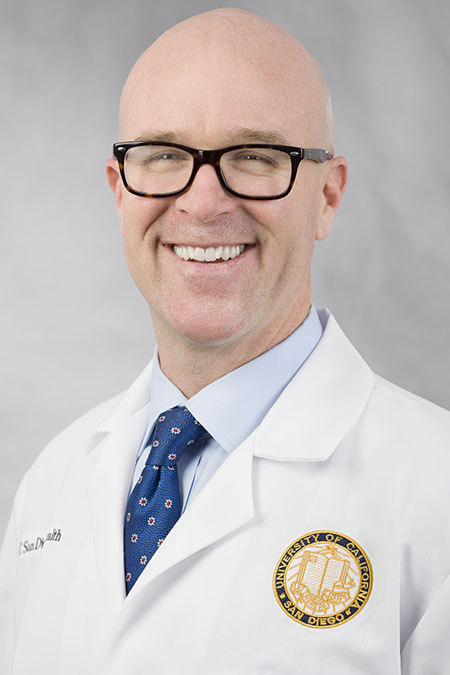Surgical Team Performs San Diego’s First HIV Donor to HIV Recipient Liver Transplant
Procedure part of a national clinical trial examining outcomes of HIV organ transplantation
Published Date
By:
- Michelle Brubaker
Share This:
Article Content
UC San Diego Health is the first hospital in San Diego and only health care system in Southern California to transplant a liver from a donor with Human Immunodeficiency Virus (HIV) into an HIV-positive recipient. The successful surgery is part of a national clinical trial that could result in more life-saving options and less time on the transplant wait list for HIV-positive patients.
UC San Diego Health is participating in two national clinical trials supported by the HIV Organ Policy Equity (HOPE) Act, which was passed by Congress in 2013. The HOPE Act permits transplant teams in the United States with an approved research protocol to transplant organs from donors with HIV to qualified recipients with HIV and end-stage organ failure.
“We are excited to be part of this groundbreaking effort that is resulting in more lives saved. The patient who underwent the liver transplant is doing well and we are incredibly grateful to the donor and family. Both have helped move science forward,” said Gabriel Schnickel, MD, surgical director of liver transplantation at UC San Diego Health. “The patients who will receive an organ in this trial are very ill and time is critical, so receiving an HIV organ increases their chances of getting a life-saving transplant.”

Gabriel Schnickel, MD, surgical director of liver transplantation at UC San Diego Health.
Twenty-three sites nationally are involved in the HOPE in Action clinical trial for HIV-positive liver transplants. UC San Diego Health and UC San Francisco are the only sites in California.
UC San Diego Health is also part of a national trial studying the use of HIV-positive kidney transplants (with 28 sites nationally). Saima Aslam, MBBS, director of the solid organ transplant infectious diseases service at UC San Diego Health, is site principal investigator for both trials.
“We are excited to be able to offer this innovative opportunity to our patients as they may personally benefit by reduced wait list times, and thus, may be transplanted earlier than anticipated when they are less sick,” said Aslam.
Both the HOPE in Action liver and kidney transplant trials are examining the outcomes of HIV-positive patients who receive organs from an HIV-positive donor compared to those who receive an organ from an HIV-negative donor.
“As the region’s only academic medical center, we are able to offer patients the most advanced treatment options through clinical trials,” said Aslam. “We want evidence-based results to better understand the outcomes of using an HIV-positive organ versus an HIV-negative organ in a patient infected with HIV. Do they have the same short- and long-term outcomes?”
This type of transplant is only legal within the HOPE Act clinical trial and only HIV-infected recipients will receive the organs. To date, four patients with HIV have been enrolled in the trial for liver transplants at UC San Diego Health, three of whom have been transplanted: two received an HIV-negative donor liver and one received an HIV-positive donor liver. Five patients are enrolled in the kidney trial, of which two have been transplanted — both with HIV-positive kidneys.

Saima Aslam, MBBS, director of the solid organ transplant infectious diseases service at UC San Diego Health.
Nationally, there are more than 12,000 people in need of a liver transplant, including more than 2,300 in California. Patients can wait several years on the liver transplant wait list in California before receiving a transplant, and approximately 15 percent die while waiting.
“The liver, in general, is a challenging organ to transplant. It is more sensitive to cold ischemia, meaning time outside the body,” said Schnickel. “There is about a six-to-eight-hour window in which we have to transplant the liver, which restricts us to a certain geographical area to receive a donor liver. This is compared to the kidney, which has about a 24-hour window, allowing the donor organ to arrive from anywhere in the United States.”
With medications to cure Hepatitis C (HCV) now available, transplanting organs with this infection into patients without it has become standard practice. Since 2017, UC San Diego Health has transplanted more than 100 organs from HCV-positive donors into HCV-negative recipients.
“We have had excellent results. This has led to an increased rate of organ transplantation and a reduction in wait list time at our center,” said Aslam, who spearheaded the HCV-positive organ transplant program at UC San Diego Health.
“But we do not have medications available to cure HIV. That is why this trial is so important. We want to be able to use organs infected with HIV to increase the donor pool for HIV-infected recipients on our wait list, giving them a second chance at life.”
To learn more about the Center of Transplantation at UC San Diego Health and how to register to be an organ donor, visit health.ucsd.edu.
Share This:
You May Also Like
Stay in the Know
Keep up with all the latest from UC San Diego. Subscribe to the newsletter today.



